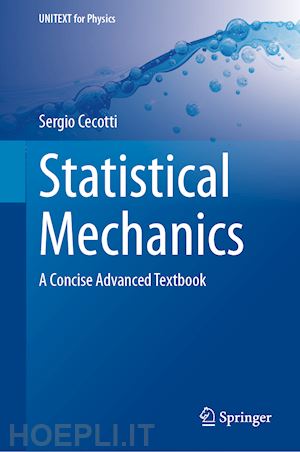

Questo prodotto usufruisce delle SPEDIZIONI GRATIS
selezionando l'opzione Corriere Veloce in fase di ordine.
Pagabile anche con Carta della cultura giovani e del merito, 18App Bonus Cultura e Carta del Docente
This textbook is based on lecture notes that the author delivered at Qiuzhen College (Tsinghua University), a Chinese institution known for its exceptionally talented mathematics students. The book's intended audience shapes its character. It introduces Statistical Mechanics from the ground up, offering a fully self-contained presentation that aims for mathematical precision. It distinguishes rigorous results from controlled approximations and provides physical insights into phenomena.
Despite its concise nature (suited for a one-semester basic course), this book covers several topics typically not found in introductory texts. These include Shannon's information-theoretic interpretation of entropy, the gauge approach to order-disorder duality in the Ising model, the Yang-Lee theory, and the quantum dissipation-fluctuation theorem. Additionally, it explores frustrated and quenched systems, including an introduction to the celebrated Parisi solution of the Sherrington-Kirkpatrick model of spin glasses.
The path integral formalism is extensively discussed from various perspectives to suit different applications. Chapter 2 approaches path integrals through the Feynman-Kac formula and second quantization. In Chapter 5, they are examined within the context of effective field theories like Landau-Ginzburg theory, while Chapter 6 delves into their connection with Brownian motion, Langevin stochastic differential equations, and Fokker-Planck diffusion PDEs. The book also explores the relationship between stochastic processes and supersymmetry.
Various techniques for computing path integrals, especially functional determinants, are introduced throughout the relevant chapters, offering the most suitable computational tools for each application.
Thermodynamical Formalism.- Equilibrium Ensembles.- NonInteracting Quantum Systems.- Phase Transitions and Lattice Systems.- Approximate Methods and Landau Theory.- Linear Response Theory Brownian Motion.- Frustrated and Quenched Systems.
Sergio Cecotti graduated with a degree in physics from the University of Pisa in 1979, and has worked at Harvard University, UCLA, the CERN in Geneva and the ICTP in Trieste. He has taught physics at the University of Pisa, the International School for Advanced Studies of Trieste (SISSA), and now at BIMSA in Beijing.











Il sito utilizza cookie ed altri strumenti di tracciamento che raccolgono informazioni dal dispositivo dell’utente. Oltre ai cookie tecnici ed analitici aggregati, strettamente necessari per il funzionamento di questo sito web, previo consenso dell’utente possono essere installati cookie di profilazione e marketing e cookie dei social media. Cliccando su “Accetto tutti i cookie” saranno attivate tutte le categorie di cookie. Per accettare solo deterninate categorie di cookie, cliccare invece su “Impostazioni cookie”. Chiudendo il banner o continuando a navigare saranno installati solo cookie tecnici. Per maggiori dettagli, consultare la Cookie Policy.